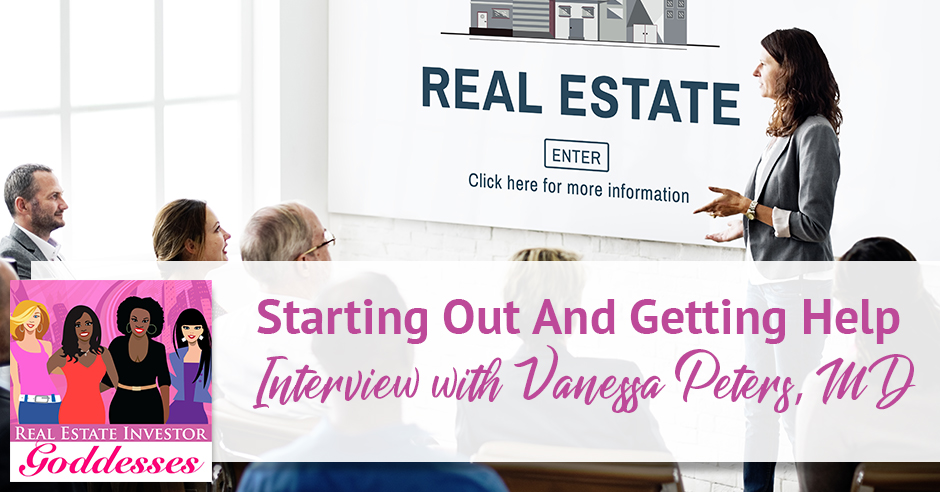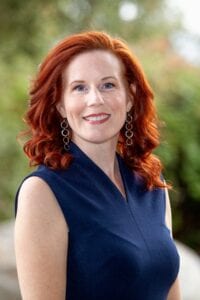
When you’re starting out in a seemingly overwhelming industry like real estate, it’s easy to get caught up in things that, down the line, you will realize weren’t necessary at all. But getting support from a community can ultimately help you get where you want to go much faster, riding on the learned experience of that community you’re a part of. Vanessa Peters, MD, is the founder of VMD Investing. She joins Monick Halm to discuss the importance of drawing support from a community when starting out in real estate. For the women out there who are just finding their legs in the real estate industry, know that you are not alone, and it’s okay to ask for help navigating the waters.
—
Watch the episode here:
Listen to the podcast here:
Starting Out And Getting Help With Vanessa Peters, MD
I’m excited to have with us Dr. Vanessa Peters. She’s the Founder of VMD Investing and she’s been investing in real estate for years in single-family homes, commercial retail apartments, short-term rental, self-storage and manufactured homes largely. It’s been a lot of different things. She’s investing in over 2,500 units across eleven properties and four funds. She is a doctor. She earned her Medical degree at the University of Calgary in Canada. She moved to the US in 2002 and she’s a Family Physician and Chief Physician Officer for Graybill Medical Group in San Diego. She’s written a book that she’s going to tell us more about and I’m excited to have her here. Welcome, Vanessa.
Thank you. I am excited to be here.
We’d love to start at the beginning. Tell me how did you get started investing in real estate?
I started investing in real estate back in 2008. Right around then, I unfortunately had a divorce, but that occurred in 2007. I took the house and he took the 401(k). It seemed a fair deal in early 2007. This was our home here in San Diego. After a few months, I started checking the home values. I had heard that things had been changing, but I was busy doing other stuff and saw that my house had literally plummeted into half of its value. It was way underwater. I consider myself fairly smart overall. I had used my house like an ATM, I had over-leveraged. When my house was worth 40% of what it was at the peak, I moved out because I had a new partner. I moved in with him a year or so later. I couldn’t sell the house. I got a renter in there and that was my first foray into accidental landlording in 2008.
Unfortunately, the rental market at that time wasn’t good enough to cover the expenses I had for the house. I thought, “We’ll see how it goes.” It’s $1,000 a month I needed to pay for this house, sometimes $1,500 depending. That’s not taking into account all of the cap and vacancy, all the things you’re supposed to take into account. This is my mortgage, this is the rent, this is the taxes. It was worse if something needed to be fixed. That was not pleasant. Hindsight is 2020 and I could have sold it for short sale right off the bat and that probably would have been the cleanest thing. Who knows? I didn’t know what was going on. I was clueless. I was in a new relationship. I was much more interested in that than this house. Later that year, I had some extra cash and a realtor friend said, “Things up in Riverside County and Inland Empire are on sale now. You might want to invest in real estate up there.”
I’d never done this before, but I took his word for it and I bought a short sale, single-family home up there for a good price. That was early though in the downturn. I purchased it and got some renters in there. After a little bit of bumpiness, we got some good renters and then it continued to go down. It depressed me a little bit and I thought, “That was a dumb thing to do. I don’t know if I should do that again.” I didn’t. I’m not being savvy in real estate. I sat on it. I got pregnant and had a baby. I got busy at work and I forgot about it, knowing that I did it and I’m going to sit with it. Later in 2010, 2012, I started looking at it again. It’s gone up. A couple of years later, it’s a lot. I wanted to buy some houses. Around 2017, I was like, “Let’s get back into this. This is a great idea.” I had this moment of I want to own real estate. It was too late here.
I searched far and wide for real estate in 2017 and ‘18 in San Diego, Riverside, local that I could drive to. Even in my local neighborhood here in North San Diego County, which is cheaper than the city, nothing worked. I got the bug at that point. I was way into BiggerPockets and reading as many books as I could find on real estate and Rich Dad Poor Dad. I got inspired and I wanted to make it work no matter what. I would hit roadblock after roadblock and I’m like, “That’s not going to work. What else can we do?” I go to some meetups locally and see what groups I can join in our area. Everybody in California is talking about, “We can’t invest here, so we can do out of state investing.” I thought, “What’s that?” As I learned about it, I wasn’t comfortable with owning an actual house in another state where I don’t know anybody because I didn’t want that risk. I’m conservative. I thought, “No, I don’t want to own a place that might have something major happen to it and I’m responsible for all that cost.” If it’s empty, it’s 100% empty. I would have to do turnkey. Otherwise, I can’t do any rehab from across the country.
I’m working full-time as a doctor. I started hearing about syndications a little bit online and I was like, “What it is that? That sounds fishy.” I looked into it a little bit more and I still wasn’t sure about it. I contacted somebody who had replied a bunch on BiggerPockets thinking he sounds knowledgeable and what’s all this about? He chatted with me, we got to know each other. He shared a deal with me and the returns were good. I was surprised and thought, “Can I make that in real estate as a limited investor, as a limited partner?” He said, “Yes.” I was like, “Holy cow.” A light bulb went off and I was like, “This is my path to real estate. The angels were singing.” I was reticent because it’s a lot of money and know these people are in Texas and I don’t know anything about them. The first deal that I did in 2018, I flew out to Texas and met them. I met the property manager and the operator. I did criminal background checks on everybody then I wired my money. That’s the short version of how I got into real estate.
Attend community meet-ups locally and see what groups you can join in your area. Share on XIt’s funny because for those of us who aren’t expensive markets, often we’re happy to break even or have a little bit either. It can be tough to cashflow and make things make sense here, even when you’re doing all the work. I have passive investors. When I syndicate, they’re surprised that as a passive, they can get good returns. They think, “If I’m doing all the work, it’s going to be a better rate of return on investment,” but not necessarily. It depends on where you’re investing.
It depends on where your time is best spent. As a doctor, my rate is high. If I do something like fix up a house, that’s not the best use of my time. I don’t know how to do it either.
Since that 2018 investment in syndication, what have you done? It sounds like you’ve invested in tons of things.
I went all in. I took as much money out of my 401(k) as I could and the rollover money. I opened a self-directed 401(k) and got into 3 to 4 deals that way. I had some cash in the bank and I spent that. I got a HELOC on my home and on investment in my investment property. I leveraged as much as I could. I went off on every deal that came along. I had three operators that I knew and they were in different niches. That’s where the mobile home parks, where the self-storage and the apartments come in. I didn’t want to be in apartments in Texas, I wanted to branch out a little bit and have a little bit more exposure in each niche. It has its own pros and cons. I felt safe. I’m conservative, but I felt excited about getting my passive income up. I had a realization a few years ago when I was vacationing with my family that I need to do more of that.
We were trained to work hard. Especially as a primary care physician, your patients need you all the time and you feel bad about taking off a week to go and do something with your family. Not only do you feel bad because your patients don’t have you, but if you don’t make any money. We’re not salaried. We only make money when we see patients, not the same for many busy professionals. When I started doing a lot of reading about FIRE and doing that thing, I don’t want to be skimping on money and having to live on hardly anything. That’s not my thing. I want to have a comfortable lifestyle, but I thought, “If I can get my passive income up to where I can almost replace my income, then I’m free. I don’t have to live in a pauper for the rest of my 40 years.”
I love that philosophy. You want to get financial independence and retire early, but you don’t have to live off the grid. That would be extreme. I still want Starbucks. I still want to have new clothes from time to time and go out to dinner with friends. I want to live still the lifestyle to which I’ve become accustomed and be able to create financial freedom. That’s what I like about real estate. You wrote a book. Tell us about the book that you wrote.
My book is The Busy Professionals Guide to Passive Real Estate Investing: A Physician’s Path to Building Wealth, Creating Financial Freedom and Leaving A Legacy. I wrote it because I felt this was something that most busy professionals, and in my case, doctors, don’t understand and don’t know about. We get this training from our financial advisors and we trust them. They tell us what to do and we do it. When I started learning outside the box, I thought, “This is amazing. More people need to know about this.” When you approach some people, they’re a little suspicious, especially doctors, by nature, are a skeptical bunch.
I was having a lot of conversations with people and I thought, “I need to write this all down,” because I’m having a lot of conversations, spending hours on the phone. I then started a business where I can teach people about this and bring them into investments with operators that I trust. The book is not going to be a moneymaking bestseller. It’s more to help educate people that I already know. This is something like, “Here’s my book,” that kind of thing. It was fun too to get my story out about how I got into investing and writing it all down was cool.

Support From A Community: In terms of your real estate investing, getting a better rate of return on investment is all dependent on where your time is best spent.
Let me ask you a question that I ask all my guests. I think this is where we get the most gold. What was your biggest mistake and what did you learn from it?
My biggest mistake is tough. The primary residence turned rental house. I did hang onto it until 2012. In 2008, I moved out, and then four years later, it still wasn’t anywhere near recovery. It still wasn’t making much. I was still feeding it. At that point, I did a short sale and that was not a mistake. It was the right thing to do. The mistake was that I waited too long to do it. If I had been more knowledgeable, I would have cut it out because it affected my credit. It affected my ability to refinance and get other mortgages and things like that for seven years. It was a long time. Also, because my realtor told me to stop paying my mortgage, and then he bumbled it and he wanted this flip TV show to buy it.
What they offered the bank was so low that they wouldn’t accept it, but it delayed it. It took a while before another buyer came through in the bank going back and forth. It was six months of no payments and that looks terrible on your credit. It’s taken me a long time to get back up to 850 where I’m at now. I’m happy about that. That was one mistake, but another one is that my financial advisors are great. I like them. They’ve helped me a ton with taxes, but they told me at one point in 2011 or 2012 that I was eligible for this type of investment, investing in industrial real estate, commercial real estate. What they meant by eligible is that I was accredited at that point.
I said, “I’ve got this money. Let’s put it in here.” It turns out it’s an all-cash, triple net industrial syndication. It’s the Staples and Petcos and stuff like that. The land under them, but it’s not leveraged. The rates, I didn’t know any better, but they started on a 5.25% annually. It’s a ten-year fund. I put three different chunks of money in that over a couple of years before I knew any better and then the rates have gone down. Now I’m getting 4.25% and then of course with COVID, they’re at 3% now. I’m like, “Give me my money back.”
It lasted for ten years?
It’s still locked up. One of them is going to start selling off in 2022, so I have a couple hundred in there. It’s not the biggest mistake in the world, but if I had been a little more educated back then, I wouldn’t have done that with that money, especially in 2012 when I could’ve had that money. I could have done so much with it.
I’m sure there are people going, “3% to 5% is good. My money’s in a bank account at 0.25%.” People thought that’s what they should do. They stick it in a savings account or a CD making 2%. In the grand scheme of things, you’re probably making 500% more than most people. What are you most proud of?
I am most proud of writing the book. I got inspired because I was part of a mastermind that everybody was writing a book and I didn’t know you could do that. I didn’t know you could write a book and put it on Amazon and self-publish. I told myself I’m going to give myself six months. I wrote most of it on a plane trip to Italy in the summertime and cranked it out and then got an editor and did all that. I had it ready to go on a table at an event, a personal development event in December. As I started in late June, finished in December. I’m proud that I was able to buckle down and do that while working and everything. I don’t even know how I did it.
Your biggest mistake could be waiting too long to do something you think you should. Share on XMany people have books in them and they never write them. Good for you for doing that. What do you attribute to your success?
I think for me, what my friends have told me is that I’m intentional. I latch onto something and I don’t give up. My husband knows that when I come home from the library with ten books on the same subject, “She’s got a new passion,” and it will often burn out. I’ll get to the bottom of it and then I’ll be done. I did a keto diet thing. I did a fermenting thing. When the real estate came along and he saw the books and he’s like, “This will be over in a few months,” but it isn’t. I found that when I want something, I’m going to find a way. I’m intentional about getting things done.
What advice do you have for a woman who’s starting out in this field?
There are many people out there that can help you now. You don’t have to go at it alone. When I started, I didn’t know about all these groups. I was at the library looking at ten-year-old books. That’s not the best way to do it. It was more when I discovered BiggerPockets and meetups. Even then, I didn’t know about the women’s networks that there are out there. I think that’s fantastic because it’s a male-dominated industry and it needs to change because we are super smart and we do things differently and a lot of times better. I’ve found that when I go to meetups, I’m one of the only women there. I’ve been in situations where I haven’t been treated so well. People looked down like, “What do you know?” That needs to change. I’d like to see more women operators out there or at least banding together and forming an operator team where there’s a network of women syndicators. I would love to be part of something like that. Reach out, get on some Facebook groups like the REI Goddesses and Women’s Real Estate Network. There are so many out there now.
Last question before we get into the trinity, what do you wish you had known at the beginning that you now know?
I wish that I had known about real estate cycles and what they meant, a little bit more about being greedy when others are fearful, that kind of thing. I was ready in 2007 and ‘08. I had enough capital per year that I could have built up a good portfolio if I had maybe a mentor. If I had maybe a little bit more knowledge and instead of hiding like everybody else and wishing that it would all go away and wishing it would come back and not realizing that the opportunity was then. That’s what I wish I had known back then.
Are you excited about what’s happening?
Potentially, yes. I think we need to be patient because real estate lags and people are going to be propped up for quite a while. If it hits the fan, it’s going to be at least more than a year away. Yes, absolutely. This time I’m ready.

Support From A Community: Real estate is a particularly male-dominated industry, which needs to change because women are brilliant, and most of the time, they can do things better than the men.
This is now the time to get ready. Where can people find out more about you?
I can be reached through my website at VMDInvesting.com. My email is [email protected] and you can also catch me on Facebook Messenger and LinkedIn.
It’s time for our famed end of show trinity, which is a brag, gratitude and a desire. What’s one thing you’re celebrating now? What’s the brag?
It’s not real estate related, but it is work-related. We are in the middle of the pandemic now and I feel my medical group of 80 providers in twelve locations, I have been leading them through this crisis. For the past several months, we’ve cut hours, we’ve cut staff, we’ve contracted, and now we’re expanding again. I feel I’m proud of the leadership that I’ve given our group. Financially, it’s hard for sure, but I feel we’re rebounding now. We’re opening up to patients and it’s been all-consuming. It’s a good thing there haven’t been too many real estate deals to look at because my life has been all about work and the pandemic. I’m proud that we have not had an epidemic here where we live. I’m happy about that.
What’s one thing you’re grateful for?
I’m grateful for this community that has taught me the alternate ways that we can live creating passive income and having more time, having time freedom. I’m grateful to all the people that I have met in the past 2 or 3 years and in these various amazing communities.
Last but certainly not least, what’s one thing you desire?
There are lots of things I desire, but real estate-wise, I have a desire to own a self-storage facility myself and own it outright and get the cashflow from it, a buy and hold thing. Now, all of the investments are flips and you sell them off to the rich or whatever. I have this comfort in thinking if I had a couple of self-storage facilities and they’re managed by someone else, I could let go to Europe or Mexico and be completely free. That’s a dream someday.
If real estate lags as an industry, you just have to be patient. Share on XSo shall your desire be or much better than you can imagine.
Thank you.
Thank you. This was awesome. I appreciate having you on the show. If you want to connect with Vanessa, you can at VMDInvesting.com and you can find her on all the socials. Connect with me at REIGoddesses.com. There you can get on the Investor Club to find out about our passive investing opportunities that we offer. Join our amazing community of women real estate investors from all over the world. Subscribe, comment, like and share all the things. Join us next time for another episode.
Important Links:
- VMD Investing
- Graybill Medical Group
- Rich Dad Poor Dad
- The Busy Professionals Guide to Passive Real Estate Investing: A Physician’s Path to Building Wealth, Creating Financial Freedom and Leaving A Legacy
- REI Goddesses – Facebook
- Women’s Real Estate Network – Facebook
- VMDInvesting.com
- [email protected]
- LinkedIn – Vanessa Peters
- Investor Club
About Vanessa Peters

Vanessa Peters, MD, is the founder of VMD Investing and has been investing in real estate for 12 years in single family homes, commercial retail, apartment communities, short-term rentals, self-storage and manufactured home parks. She has invested in over 2500 units across 11 properties and 4 funds.
Vanessa Peters earned her medical degree at the University of Calgary, Alberta, Canada and moved to the US from Canada in 2002. Dr. Peters is a Family Physician and Chief Physician Officer for Graybill Medical Group, a primary care owned medical group in North San Diego County with 12 locations and 80+ providers.
Love the show? Subscribe, rate, review, and share!
Join the Real Estate Investor Goddesses Community today:





